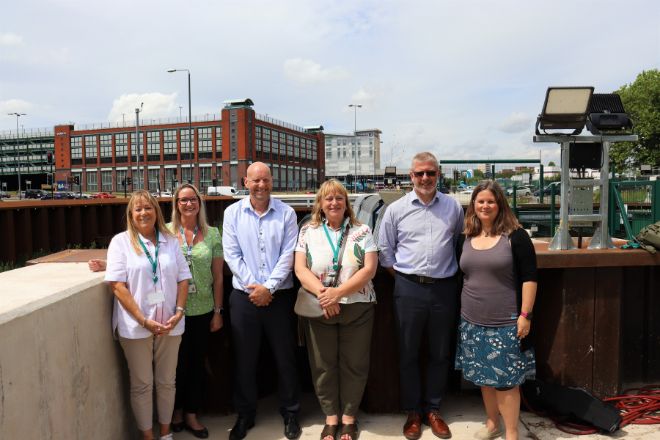Brand new pumping station adds to Derby’s flood defence network
Published: 23 June 2023

From L-R: Cllr Carmel Swan, Louise Cresswell (EA), Dave Turnbull (EA), Sarah Banks (DCC), Murray Parker (DCC), and Alex McDonald (EA)
Construction work has finished on a vital part of Derby’s new flood defence network.
Mill Fleam Pumping Station on Bass’s Recreation Ground will provide a much higher level of protection to shops and businesses in the city centre.
During a flood event it will pump water from Markeaton Brook, which runs through a culvert under the city, into the River Derwent. This will prevent floodwaters backing up under the city and escaping through drains.
This marks the end of the Munio Projects, part of the Our City, Our River (OCOR) scheme to enhance Derby’s flood defences and pave the way for regeneration. Known as the Munio Projects, from the Latin word meaning to strengthen or protect, this key phase of flood defence work covers the west bank of the Derwent from Darley Abbey to Alvaston Park.
Brand new flood walls, flood gates and the pumping station have been combined with improved landscaping to provide the city centre with a flood defence system that protects the city’s heritage.
Cllr Carmel Swan, Cabinet Member for Climate Change, Transport and Sustainability, said:
This pumping station is just one part of a more comprehensive raft of defences that have already proven their worth in recent flood events, and offer protection for people's homes, businesses and livelihoods. This project shows our dedication to shielding our city from climate change's effects and our commitment to Future-proofing our city.
As we move to the next phase, the wider OCOR scheme will bring fresh business opportunities, boost our resilience against environmental challenges, and continue to enrich our area's biodiversity.
The River Derwent, Derby's priceless treasure, has been overlooked for far too long. However, the OCOR programme has sparked a renewed relationship with this remarkable natural feature, invigorating areas along its banks.
This isn't just a promising future; it's an exhilarating journey we are embarking on, one underpinned by dedication and trust, and I'm excited to lead the way.
Louise Cresswell, Area Director (East Midlands) for the Environment Agency, added:
We are proud to support the Our City Our River (OCOR) scheme and all it has achieved to date. Flooding can have such a devastating impact on people’s lives which is why the completion of Mill Fleam Pumping Station is a significant milestone in improving flood protection infrastructure within Derby. We look forward to working closely with Derby City Council on the next phase of OCOR and helping to improve the environment within the city for people and wildlife.
Currently over 2,000 properties have better flood protection due to OCOR works. But the project is about more than flood gates and pumping stations, with environmental, cultural and heritage benefits across the project.
One of OCOR’s key objectives is to enhance the heritage assets of Derby and help promote the city as a tourist destination. As a result, several new interpretation boards now provide an opportunity for citizens and visitors to connect with Derby’s culture and heritage. Various archaeological work evaluations also took place to see whether any buried remains had survived in the proposed work areas, with various digs taking place with the local community.
In the Derwent Valley Mills World Heritage Site and the Darley Abbey Conservation Area, 35 properties accepted the offer of Property Level Protection, which includes the installation of new flood resistant doors and windows to reduce the risk of water entering the buildings.
To enhance biodiversity in the area, bird and bat boxes and otter holts have all been installed along the river to provide habitats for wildlife, and a new fish refuge lagoon has been built on the Mill Fleam, near the pumping station. An extensive tree planting scheme has also begun in some areas and will continue as OCOR works progress.
Plans for the next stage of OCOR involve a series of transformative changes at Derby Riverside, which will deliver further flood defences, an urban community, and further sustainable development opportunities. The planning application for these works has been submitted and can be viewed on the Derby City Council planning portal.